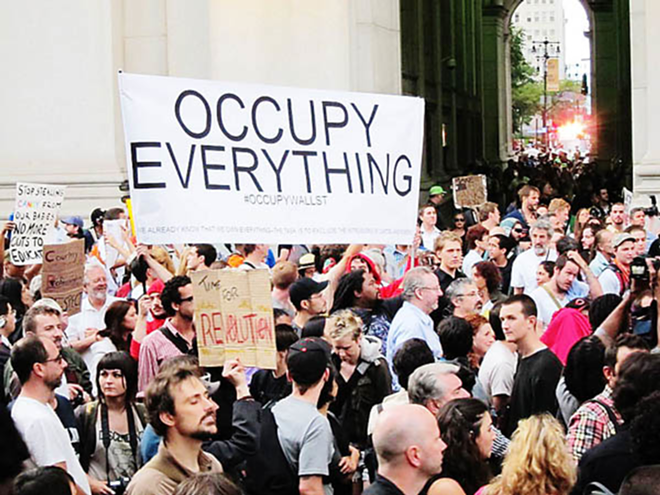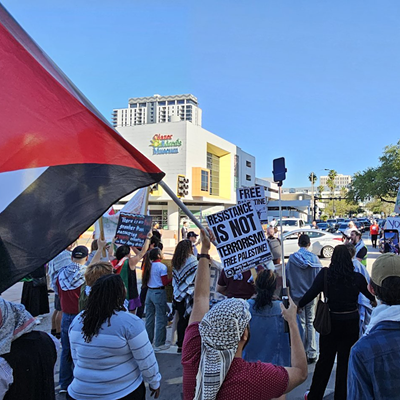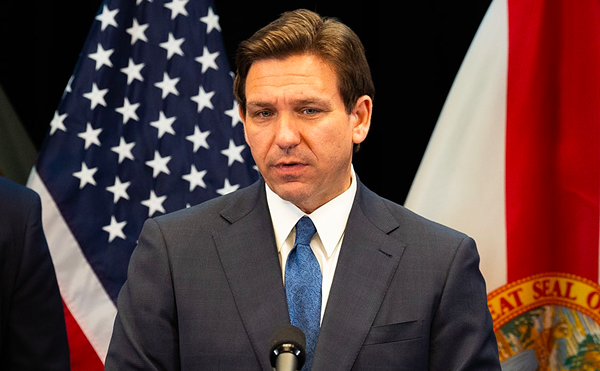In the two short weeks since I left Tampa for New York to help report on the then media blacked-out Occupy Wall Street protests, the movement has spread virally to hundreds of cities internationally — including Cigar City. It was both odd and awesome to come back to find hundreds of people in my home town (not typically known for radical activism, aside from the Ronda Storms teabagging variety) speaking through a people's mic about "the 99%."
The light speed of the Occupy meme is a testament to the information age, the power of twitbook, and proof that the great Gil Scott-Heron was born just a little too soon. The Revolution (or whatever one calls it) is in fact being televised (or live-streamed on the Internet, to be more precise). It's a pretty remarkable post-modern phenomenon to behold.
Almost as remarkable is the fact that one of the viral media architects of the grassroots Occupy Wall Street movement is himself an ex-Wall Street stock trader. Vlad Teichberg of NY's Glass Bead Collective/Mobile Broadcast News had just returned from witnessing (and live-streaming) the massive economic protests centered around the occupation of Puerta del Sol in Madrid when he returned to the Big Apple to find a ragtag but dedicated group of kids had taken over a park in downtown Manhattan. "We need to get this out there," Teichberg said last week as he hovered over a mass of laptops and video cameras in Zuccotti Park recording one of Occupy Wall Street's daily General Assembly meetings. "This is going to spread, because for the first time in our memory there is an open civil discussion filled with mutual respect about our future, which is looking more and more bleak every day."
Clearly, Occupy Wall Street has struck a chord with those most disenchanted with our failing economic system. But the rocketing of the movement into America's public consciousness also comes with built-in challenges. Many of the same politicians complicit in creating the corporate deregulation frenzy that magnified the crisis are now trying to co-opt Occupy Wall Street into a blame game. The very bastards who rewarded the drunken greed that systematically ravished the middle class, gutted our environmental standards, started obscene wars over dwindling resources, and sent our economy spiraling out of control are now calling Occupy Wall Street a "watershed moment" and incorporating it into their re-election campaign rhetoric.
Yet part of the brilliance of the leaderless Occupy Wall Street is that the movement is too savvy, too brutally honest, and too fed up to allow that to happen. While their lack of immediate demands has enraged media pundits and confused those watching at home accustomed to quick digestible sound bites, the Occupy movement, through daily direct democracy dialogue, and sometimes painfully slow but thoughtful consensus decision-making, has not allowed its vision to be clouded by the media's pressures to get to the point.
That's because what's being discussed on Wall Street and around the country cannot be distilled into a single issue. It's not just "End the Fed" or "make the rich pay more taxes." It's about changing the fundamental values that dicate how our society works. As one painted cardboard sign on Occupied Wall Street reads: "The system was never broken, it was built this way." Unless we, as a human species, begin to tackle the question of how to live sustainably and in harmony with nature, we may not have much time left. The converging catastrophes of climate change, peak oil, over-population and the bursting of the debt bubble are all staring us in the face. Is it too much to fathom that the solution to this global economic crisis might lie in the very demise of the system that created it? That's what the Occupy Wall Street folks are getting at. That this is our global Easter Island moment and we don't have much time to turn it around. That idea doesn't always make a snappy media soundbite, and it will take years of hard work to accomplish, but there are signs that what's happening now all over the country and around the world has lit a fuse.
Kelly Benjamin is a journalist and former candidate for Tampa City Council. He has reported on the Wall Street Occupation for WMNF and other outlets since the protest began on September 17.


















